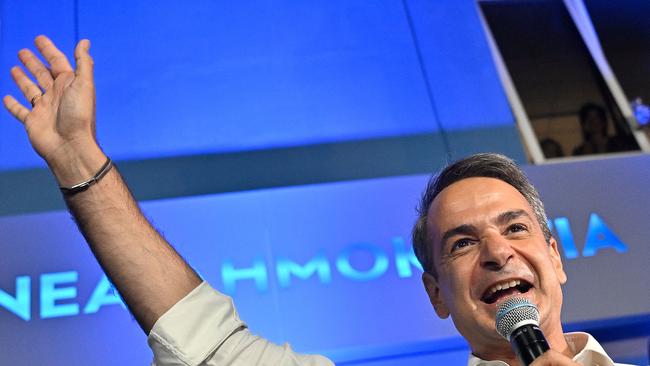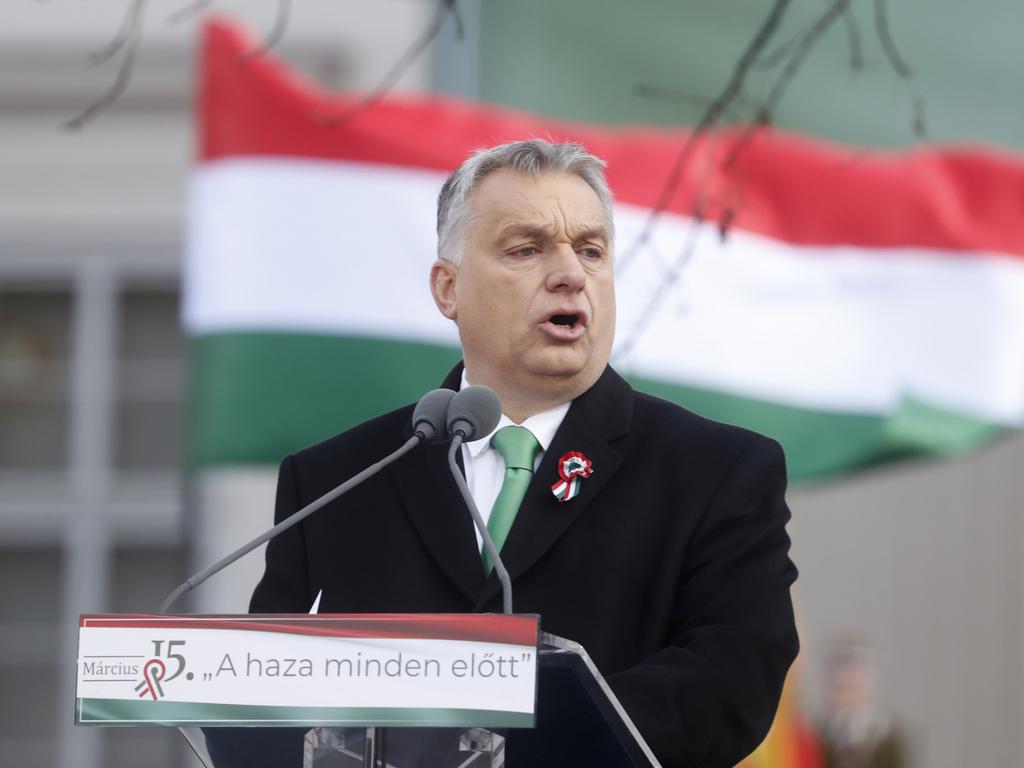Conservative victories rock Europe’s woke establishment
Don’t label these emerging parties as far right, they are far more mainstream.

– English philosopher Roger Scruton
“We don’t stand with Ukraine because we like the war. We stand with Ukraine because what we want to defend is stronger than the fear of war.”
– Italian Prime Minister Giorgia Meloni
“I do not love the bright sword for its sharp edge, nor the arrow for its swiftness, nor the warrior for his glory. I only love that which I defend.”
– JRR Tolkien, author of The Lord of the Rings
In Sunday’s Spanish national election, Socialist Prime Minister Pedro Sanchez is likely to be replaced by conservative Opposition Leader Alberto Nunez Feijoo. But perhaps the most fascinating result will be how well populist right-wing upstart party Vox does.
Transfixed as we are in this country with US politics, and to a lesser extent their British cousin, we are in danger of missing a big trend across much of Europe – the revival of conservative political fortunes.
As of writing, Vox is running well over 10 per cent in the national polls. It’s routinely described as far right. The label far right is problematic and doesn’t properly capture the range and newly mainstream quality of the emerging right-wing parties in Europe. Some of them are extreme, many are not. It’s better, I think, to call them national conservative parties.
Labelling them far right is an effort to rule them out of the debate. That effort has now failed.
Vox is reasonably representative of the national conservative parties, but each party, and each national context, is distinct. A Vox election video featured its leader riding a horse into battle to background music from the film version of The Lord of the Rings. Vox is fiercely concerned with Spanish national sovereignty. It wants tough controls on illegal immigration. It strenuously opposes Catalan independence. It defends traditional Spanish culture. It would like Spaniards to have more children.
It has two slightly odd wrinkles. Its economic policy is more pro-free market than most such parties. And it rejects not only gender fluidity ideology but also a good bit of modern feminism, arguing that laws should not distinguish between men and women except when obviously necessary.
Its critics would say it has connections to the dictatorship of General Francisco Franco. But Franco’s regime ended with his death in the mid-1970s. Vox leaders are not old enough to have played a role in Franco’s rule. And they don’t suggest any return to Franco-era policies. But neither do they accept the left’s version of Spanish history, which too often fraudulently valorises the communists in the Spanish civil war of the 1930s.
Just lately, conservatives have been winning a lot of elections in Europe. Last month, Greece’s conservative Prime Minister Kyriakos Mitsotakis won re-election. Minor parties further to the right won small vote shares. In last year’s Swedish election the leftists were thrown out and conservative Ulf Kristersson became Prime Minister. His government depends on support from the Sweden Democrats. The Sweden Democrats are the second largest party in parliament, with 73 out of 349 members of parliament.
Some of its founders were neo-Nazis and white supremacists. But, like other national conservative parties, it purged its ranks of such people and moderated its policies. Now its signature obsession is with much stricter immigration controls, especially of Muslim migrants from the Middle East and North Africa. It also opposes multiculturalism and wants government and society to promote Swedish national identity. Unlike some other national conservative parties, it supports gay marriage.
In Finland this year the Social Democratic Party-led government was ousted in favour of a conservative coalition that includes the Finns Party, which ran strongly against immigration from outside Europe and on harsh criticism of the EU.
In The Netherlands in provincial elections in March a newly formed farmers party won 20 per cent of the vote campaigning against climate change restrictions on farmers.
But the greatest triumph of the new national conservative parties came in Italy’s election last September. This catapaulted the charismatic and fascinating Giorgia Meloni to the prime ministership. She founded her party, the Brothers of Italy. Its antecedents had some fascist roots but she and the party condemn the abuses of fascism robustly and unequivocally.

She ran under the slogan “God, homeland and family”. Like most national conservatives, she is more than a bit Eurosceptic. None of the Eurosceptics now argue for their nations to leave the EU altogether. Paradoxically, Brexit has put an end to that movement, at least for now. The EU made the Brexit process itself so difficult and costly; and the Brits have, until Rishi Sunak became Prime Minister, run a pretty ramshackle government after they got Brexit.
But that doesn’t mean European Euroscepticism is over. Instead the various national governments influenced by conservatives resist, sometimes fiercely, EU encroachments on their legitimate sovereignty, especially over issues such as border control.
Meloni takes a hard line against illegal immigration. Unlike some other European national conservatives, she is devotedly Atlanticist and pro-NATO. She was open to better relations with Vladimir Putin’s Russia until Putin’s insane invasion of Ukraine. Since then she has become a fierce critic of Putin and supporter of Ukraine.
On social issues, Meloni is conservative but not taking any radically conservative actions. She is, like most national conservatives, strong on law and order, on anti-crime measures. She also links illegal immigration to crime. She is anti-abortion but is not trying to change Italy’s law on abortion. She accepts Italy’s provisions guaranteeing same-sex civil unions. But she won’t move to the formal institution of gay marriage. And, like all the European national conservatives, she doesn’t want gender fluidity and the like taught to schoolchildren.
She once provocatively declared: “I am Giorgia, I am a woman, I am a mother, I am Italian, I am a Christian, you won’t take it from me.” A decade ago she wrote: “I am a right-wing woman and I proudly support women’s issues. In recent years we have had to suffer contempt and racism from feminists.” Meloni is not everyone’s cup of tea, but to call her or her government far right is ridiculous.
If every party is to be judged by the worst excesses of its past, or the past of its antecedents, few would pass muster. In truth it’s a standard applied only to right-wing parties, which the liberal establishment wants to keep out of the debate.
Sinn Fein a few short decades ago explicitly supported terrorism. It could form the government of the Republic of Ireland after the next election. Its rivals in Northern Ireland, the Democratic Unionist Party, come from a party that was viciously and violently sectarian a century ago.
The US Democratic Party supported slavery before and during the American civil war and violently opposed civil rights for African-Americans for many decades after the civil war.
The Australian Labor Party was led, until 1967, by Arthur Calwell, who passionately supported racial discrimination in immigration selection under the White Australia policy and famously cracked: “Two Wongs don’t make a white.” Indeed, a decade ago Labor was opposed to gay marriage. Yet in some cases this in itself can be enough to get a party labelled far right.
John O’Sullivan, president of the Danube Institute in Budapest, argues in an essay, When Liberal Democracy Becomes an Ideology, in his volume The Woke versus the West, that the term liberal democracy has been redefined to become coercive and radically different from what it meant historically.
Under its traditional meaning liberal democracy, O’Sullivan writes, “is a set of rules designed to ensure that government rests on the consent of the governed. Except within the broadest limits, it does not inherently dictate what policies should emerge from government, or what social arrangements should be tolerated or prohibited.” More recently, he suggests, liberal democracy has been redefined in some circles to embrace a whole raft of specific, ultra-progressive, indeed radical, social practices and environmental policies too. Any departure from these policies, even within a fully democratic society, can be labelled as far right or as the negation of liberal democracy.
It was considerations such as this that led Hungary’s Prime Minister, Viktor Orban, to coin the ugly term for his nation’s political experiment “illiberal democracy”. Now the Hungarian government argues instead just that it is a conservative democracy. Canberra doesn’t regard the Budapest government as authoritarian but disagrees with some of its social policies.
These mostly amount to a concerted effort to offer financial support to encourage Hungarian families to have more children. And as with most European conservatives, there are limits to gender fluid and LGBTI material in education and, in Hungary’s case, on daytime TV, though there are no unreasonable laws about people’s privacy or personal behaviour.
Poland, too, is at political war with the EU over a raft of issues, even as support for Ukraine has drawn Warsaw closer to Brussels. With Hungary, Poland is the marker of defiance of woke social policy and national submission to the EU.
Poland is refusing the insane effort of the EU to forcibly distribute irregular immigrants among the member countries. This policy can never work anyway because wherever immigrants are initially put, or notionally settled, they are free to travel to their preferred destination nations – mostly Britain, France and Germany because of their generous welfare provisions. But Poland is not a nation lacking in generosity. It has welcomed nearly seven million Ukrainians fleeing conflict and something like 1.5 million Ukrainians have stayed permanently in Poland. But Warsaw sees what uncontrolled Middle Eastern and North African immigration has done to France and Sweden in terms of crime and defiance of the police, and to a lesser extent to Germany and Britain, and it’s determined not to repeat that experience. Warsaw believes EU membership doesn’t require surrender of control over immigration from outside the EU.
Germany and France are not immune to the conservative revival either. The opposition Christian Democrats now lead Germany’s ruling Social Democrats in the polls. However, also ahead of the Social Democrats is the Alternative for Germany, a conservative party that in many ways does more fully justify the label far right. It has a more odiously pro-Putin element to it. It is only a few points behind the Christian Democrats. Its support comes overwhelmingly from the poorer eastern parts of Germany. Its signature issue is immigration and it represents people who feel the German government, and the EU consensus, doesn’t represent or care about them and holds their views and life experience in contempt.
Meanwhile in France Marine Le Pen’s National Rally has displaced the traditional centre-right parties. She has substantially increased her vote at every presidential election and could well win the French presidency next time. She too is a Eurosceptic nationalist opposed to unregulated immigration that she, quite reasonably, ties to crime.
One striking feature of the conservative revival in Europe is that in many cases the new national conservatives have displaced the traditional conservatives, as in France and Italy, or have become so strong that they must be included in coalition, as in Finland, or in parliamentary support arrangements, as in Sweden. It will be fascinating to watch if Spain’s mainstream conservatives, the People’s Party, are forced into coalition with Vox.
The national conservatives, the new right parties, have changed the definition of what is centre-right and what it is acceptable to say. Meloni is not scared to talk of God. She is a deeply earthed Italian but her major intellectual influences are Roger Scruton, GK Chesterton and JRR Tolkien. She indeed used the Scruton and Chesterton quotes at the top of this article in a seminal speech recently.
Three issues have driven the resurgence of European conservatives. The first is Middle East and North African immigration. It’s wrong to oversimplify this as blanket hostility to immigration altogether. Poland and Hungary have been happy to take large numbers of Ukrainians. Neither is it racial. Large Indian and Chinese minorities are not controversial. But, like John Howard and Tony Abbott, European conservatives believe their national governments have the right to determine who comes into their countries and that some people are more likely than others to settle constructively.
The second big issue does not get enough attention, and that is a growing revolt against the excessive costs and sheer unreality of so many EU climate change policies.
No European government stands against the idea of reducing greenhouse emissions, but many are turning against all kinds of climate policy overreach. Proposed nature restoration laws have been hugely watered down in the European parliament. Notwithstanding severe heat wave conditions, vastly costly regulations are being opposed and scaled back. Conservative politicians are increasingly setting a limit to the cost they will pay for green measures and the energy price rises they will put up with. If conservatives do well in next year’s European parliament elections this trend will accelerate, although it is national governments that count the most.
And the third issue driving the conservative resurgence is the sense that transnational wokeness in all its guises is an assault on the good traditions of European civilisation. Meloni, like many European conservatives, is not afraid to mention God and Christianity when talking about Italian, or even European, values.
Mario Fantini, the Vienna-based editor-in-chief of the European Conservative, tells me he thinks the Anglo-American tradition of conservatism rooted in Edmund Burke and Adam Smith, has less and less to say to contemporary society. European conservatism, more open about its religious roots and closer to ordinary people, has a lot to offer.
Of course, one big question is whether these conservative governments will be able to make any lasting and institutionalised changes. The EU itself is a tremendous force against democracy and will try to keep European governments bound in EU straitjackets.
The inspiration European conservatives take from Tolkien is fascinating. The Lord of the Rings is first of all a magnificent tale about good and evil. It’s a truly Western classic in that it cannot be properly appreciated without a knowledge of all its biblical motifs and references. But it’s also a tale of localism, of good people, friendly to all, but inspired to courage and sacrifice from love of their own societies and traditions.
The resurgence of European conservatism in a militantly woke age of seemingly endless progressive domination is as yet more promise than performance, but still full of hope.








“The real reason people are conservative is because they are attached to the things they love.”